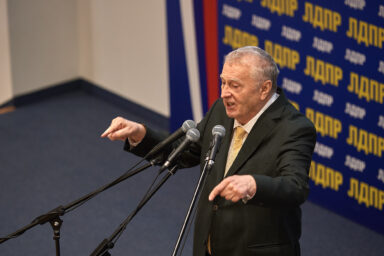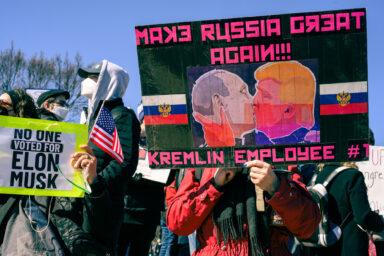For most Muscovites, it’s business as usual. And many of those impacted by Western sanctions expect everything will be back to normal soon.
What is it like to be on the street in Moscow right now?
Two Russian men talk about their lives in the city today. The first is a Russian tech worker living in Moscow.
Right now in Moscow the “a few months theory” reigns supreme.
One is unlikely to recognize that Russia is even a country at war. However, some people on the street are discussing the international situation. “Haven’t we already taken Kherson?” or “the Chinese will never let us down.” (Most Russians think China will replace the West as a trade partner and they will be fine.)
Local Moscow businesspeople are quickly adapting to the new situation without much debate or concern. “We have switched our logistics and run deliveries through Belarus now; it is very convenient. We can always switch back if the situation resolves.”
There is a lot of public talk about sanctions destroying the Russian economy. Inside shopping malls, all the signs and PA broadcasts indicate the current closures are only temporary.
In one large Moscow mall, about 30 percent of stores are closed but store advertising emphasizes they expect to reopen soon. This contributes to the widespread belief that everything will be back to normal in two to three months.
Even McDonald’s hasn’t really pulled out of Russia; it just reduced its public profile. Its franchises keep operating, mostly in the eastern parts of Russia.
There are very few publicized cases of company layoffs resulting from the sanctions. Most of the national chains are putting people on paid leave for two to three months and discussing what their strategy will be “when everything is back to normal.”
Dmitry Anatolyevich Medvedev, the deputy chair of the Security Council of Russia, said the national chain companies are signaling to the Kremlin they are just paying lip service to the sanctions and none are willing to leave. This appears plausible because one of the Big Four accounting firms is rebranding in Russia, informing its clients that all contracts will be kept under the new corporate entity.
In offices, some white-collar workers feel like they are living through a catastrophe. The majority of businesspeople are planning to explore new opportunities and believe things will get back to normal pretty soon.
Open discussions about the “special operation” in Ukraine are rare because dissent is criminalized. Keep this in mind when reading Russian poll numbers. Two women stopped on the street to greet each other and talk; when one woman declared she was against the special operation, a passerby almost attacked her for being a traitor.
From St. Petersburg. The message reads, “This is my grandfather’s coat. During WWII, he starved as a child in occupied territory.” (Then I can’t quite make it out, maybe: “Why have we ghouls in my time forgotten his distant past?”) “I feel sick and scared. I don’t want war!” pic.twitter.com/7C5SuXrjkm
— Kevin Rothrock (@KevinRothrock) March 19, 2022
Many families are split along generational lines; younger people prefer to abstain from discussing Russia’s war on Ukraine with parents.A friend gets tons of messages from her mother about “Ukro-Nazis” running Ukraine.
There are minor shortages of medications, and some people are trying to replenish their stock. However, the initial panic seems to have died down now.
The ruble appears to have bounced back. It is still difficult to buy currency in Moscow, but the exchange rates are promoting confidence. It is actually possible to go to a neighboring country and buy dollars practically at the same rate as before the “special operation” started.
The current inflation is not publicly connected to the military operation. A taxi driver from Belarus complained about rising prices. However, from his perspective prices were rising for several years already, it is just that for some reason it’s even worse now. He didn’t mention war.
There is tension in the air, however. Several people ask if there will be a war. This implies, of course, that there is no war currently. There is a belief that Poland could probably cause a war.
The use of nuclear weapons has been completely normalized. Conversations about the consequences of war often trigger the nukes threat. “They will lift all these sanctions because we have nukes” or “they will give in anyway; otherwise we will try out our nukes on them.”
For many Russians, Putin is proving the ingrained Russian belief that “might makes right.” Hubris is unlimited: One simply has to be impudent enough to become the master of the universe. The West is often said to be weak because it is not ready to risk a nuclear war.
Currently, automobiles are not demonstrating an enormous amount of enthusiasm for the special operation within the city. There are a few cars driving around with “Z” symbols but even more with anti-war slogans. This is in sharp contrast to 2014 when there were many pro-war ribbons on cars. Many of these ribbons are still on those cars.

In universities, students are told to spy and report on their instructors, although very few do so. This situation creates enormous tension in the classroom; one spy is enough to send anyone to jail.
People on the street seem to be in 100 percent agreement with anything Putin or Kremlin TV says, regardless of how absurd it may be. Even hard evidence from their own family in Ukraine does not change their minds.
It is difficult to say what the reaction will be if the “a few months theory” fails. It seems possible that a significant part of society will conclude it is too late to stop the war, and it’s likely the war would then be perceived as existential (to be won at any cost).
While these are the perceptions of one person in Moscow, there is evidence that this reality is pervasive across the city.
The Moscow-based group Chto Delat, started by Michael Anonymous, shows how universal the pro-Kremlin sentiments actually are.
These Chto Delat interviews consist of two shooting sessions: on March 25 at the Novye Cheryomushki metro station and on March 28 at the Novogireevo metro station.

Ninety-nine percent of the people interviewed strongly support the Kremlin’s version of reality. The one woman who opposed the Kremlin asked to hide her identity.
Chto Delat is a small group of about a dozen people living in Moscow who have published 70 such interviews on various sociopolitical topics over the last year.
I spoke with Michael over Telegram one night when he had some free time. He agreed to answer some of my questions about his organization and how it (and he) functions in Moscow today.
In an email Chto Delat founder Michael explained:
I understand that our project is a possible target for Russian censorship and political repression. We originally thought of this as just a journalistic project. We did not create an organization with any specific agenda, we just wanted to record the political & social environment of Moscow.
The video editing, post-production, etc., are done by two people who develop the ideas and questions for each of the video recordings. Three more people do various administrative duties, equipment renting, finding consultants, focus groups and looking for help with funding. So far we run this channel out of our own pockets, without any outside funding. We do not receive income from content monetization and can’t raise money through donations, due to Russian legal difficulties.
Our staff is made up of all different kinds of people, four have families with children, one even has grandchildren and one person is single. Our project is not anonymous, all 5 producers and the interviewer are listed in the end credits. As for me personally, I can no longer conduct public activity on social networks or anywhere really as me.
The way we operate is 1-2 times a week we go to random locations, usually in Moscow and we question random people over the course of 3-4 hours. Sometimes we record 2 or 3 or even 4 themes in one record session. We do an additional video recording the next day when there is not enough material for an honest representation of the issue. Then we produce videos and release them 2-3 times a week. Several copycat groups that have popped up like Chto-Delat! but we do not coordinate with any of them.
In the video comments sections, there are accusations that we hired actors and ridiculously, even that we use chroma key and CGI, but in fact we really just record actual random unprepared and unknown people on real streets. We also do full-fledged formal interviews with socially important people as well.
Our activities do not require any permits, approvals, and/or licensing according to the current laws of the Russian Federation. All our respondents give verbal consent to be filmed and broadcast (we never shoot without consent). The police are not always the biggest problem, sometimes the respondents look, speak, and act like zombies. I am often afraid they will attack our correspondent or our production staff.
As a precaution, we have a few trusted persons and lawyers who, I hope, will be able to help if we get into legal problems. We also have quite a few contacts in the independent and oppositional Russian media, for counsel, but most have emigrated after getting banned.
At the beginning of March, we were questioned by the police on the street, but we did not receive a formal complaint. However, I understand that with the tightening of the Russian regime and our increased recognition and influence, we can be arrested at any moment. Right now we’re just trying to avoid the police.
Three of our producers have been arrested several times in the past for their civic and political activism. At the moment, this has not affected the channel. All of us have been members of the legal opposition party in the past, some are still, but not me. Other staff have actually been political activists, but all those organizations have been crushed. The active members who have not emigrated are imprisoned or under FSB [Federal Security Service] investigation. All political opposition activity in Russia today is prohibited.
One of our founders actually went to prison for a year and he is still under investigation on charges related to his business projects, but really this is only because of his political activity and social projects.
We occasionally communicate with well-known Russian oppositional political bloggers, journalists, and political figures who recommend our project to their followers. Unfortunately, we have not been able to make any formal media agreements with any of our colleagues. Many of them have recently ceased their activities due to ““the special operation” and the government threats.
I have to go now but I wanted to ask, in your opinion, would our cases be interesting for the agency granting political asylum? I feel the future here in Russia looks very sad and terrible, so there may be a moment when an evacuation route will be vital. The difficult personal circumstances of each of us has prevented our emigrations at this time but soon we may not have a choice .
Back on September 15, the Investigative Committee of Russia opened a criminal case against several Telegram channels for “inciting riots.” The maximum penalty under new Russian law is 10 years in prison. “At least 11 people from seven regions of Russia” have already become defendants in the case, the Investigative Committee said. But the department’s statement only mentions one of them — Dmitry Chebanov, the 44-year-old Moscow resident who launched the Telegram channel “Chto-Delat!”.
As of now, Michael and his colleagues at Chto Delat have not been named in any FSB investigations. But, as Michael wrote, that could change at any moment.



